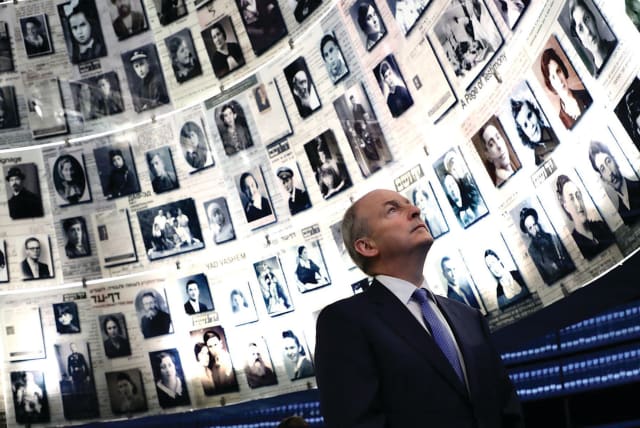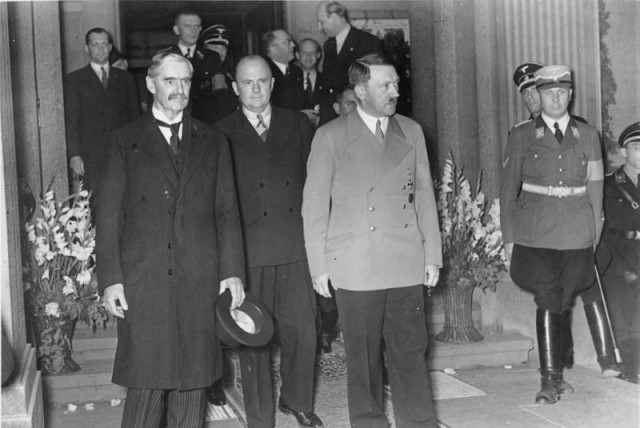Addressing the Nazi skeleton in Ireland's closet - opinion

In light of Irish Foreign Minister Micheál Martin visit to Israel last month, is Ireland ready to acknowledge their Nazi-sympathizer past?
Most Israelis did not notice that last month Irish Foreign Minister Micheál Martin visited Israel, the Palestinian Authority, and Jordan. Had they paid some attention, they could have seen Martin playing the good global citizen, doing his part to promote peace and justice in the Middle East. If they looked deeper still, they may have been struck by Martin’s refusal to address the Nazi skeleton in Dublin’s closet.
Ireland’s foreign minister received a red-carpet welcome in Israel. In addition to his counterpart Foreign Minister Eli Cohen, Martin was received by Prime Minister Benjamin Netanyahu and President Isaac Herzog – whose grandfather, Yitzhak Halevi Herzog, was Ireland’s chief rabbi.
Martin’s Arab hosts were similarly gracious: in Ramallah, he met with Palestinian Authority President Mahmoud Abbas and in Amman with King Abdullah II.
Martin leads Fianna Fáil, the political party that dominated Irish politics for most of the 20th century. Above being foreign minister, Martin serves as deputy prime minister (Tánaiste). Until December 2022, he was Ireland’s prime minister (Taoiseach), but relinquished the post to Fine Gael Party head Leo Varadkar as part of the coalition agreement between them.
Possibly, it is Martin’s leadership of Fianna Fáil that has made it especially difficult for him to honestly confront his country’s shocking behavior at the end of World War II.
Sympathy for the devil
For almost five decades, Eamon de Valera was Ireland’s preeminent politician. He was the Irish Republic’s founding father, serving (nonconsecutively) as head of government for some quarter-century and as head of state for an additional 14 years. De Valera established and ruled supreme over Fianna Fáil.
On May 2, 1945, Irish newspapers carried headlines with the news of Hitler’s suicide. On that same day, and despite advice to the contrary from his senior foreign policy advisers, prime minister de Valera personally visited Germany’s legation in Dublin. There he expressed Ireland’s condolences on the passing of the Führer to Eduard Hempel, the Nazi regime’s senior diplomatic representative.
By then, the horrors of the Holocaust were widely known; the Nazi death camps having been liberated one after another by the advancing Allied armies.
The first major extermination factory liberated by the Red Army was Majdanek, on the night of July 22-23, 1944. The Soviets reached Auschwitz-Birkenau, the largest site of industrial mass-murder on January 27, 1945. American forces entered Buchenwald on April 11 and Dachau on April 29. The British freed Bergen-Belsen on April 15.
As these liberations received press coverage worldwide, de Valera could not claim he was unaware of the genocide perpetrated against the Jews. Nonetheless, he chose to honor Hitler, knowing that he was not obliged to do so – later, he would admit that he “could have had a diplomatic illness” that would have prevented him from signing the German condolence book.
If de Valera erroneously believed that Ireland’s neutrality in World War II necessitated an official visit of commiseration, he could have sent a low-level government representative. Instead, he went himself, asserting: “I certainly was not going to add to his [Hempel’s] humiliation in the hour of defeat.”
Publicly paying respects to the Nazi leader did not prove a disqualification from high office in postwar Ireland. De Valera continued to serve as prime minister and leader of the opposition, going on to be elected president in 1959.
Unlike Ireland, in early 1945 eleven neutral nations jumped on the victorious Allied bandwagon and declared war on the Axis: Chile, Ecuador, Egypt, Lebanon, Paraguay, Peru, Uruguay, Saudi Arabia, Syria, Turkey, and Venezuela.
Because Dublin never jettisoned its World War II neutrality, it was unable to become a founding member of the United Nations. Ireland only joined the international organization in December 1955, alongside Franco’s Spain (some 700 Irish fought on the Nationalist side in the Spanish Civil War, the largest country contingent of pro-Fascist volunteers).
Lessons not learned
During his visit to Israel, Foreign Minister Martin was at Jerusalem’s Yad Vashem memorial. In his words, he was “honored, humbled, and moved” to be there, stressing that “we never forget what happened during the Holocaust, or the enduring lessons learned through the darkest period of human history.”
Unfortunately, he did not seem to want to talk about any enduring lessons for Ireland.
The Irish Independent newspaper reported that when asked about the infamous May 1945 condolence call, Martin dismissed any criticism of de Valera as “shallow.”
He said that the issue did not come up in his meetings with Israeli interlocutors, adding that de Valera was “very respected” by Ireland’s Jewish community and that “there is a lot of history about World War II and we are not going to find answers in a sound bite.”
Irish Jews, a tiny minority in a country where national identity and Catholicism were deeply intertwined, would have of course been respectful of Ireland’s prime minister and president. Only in 1965 did the Second Vatican Council repudiate the centuries-old antisemitic deicide charge, and it was standard behavior for small Diaspora communities to seek the favor and protection of the authorities.
And if the foreign minister abhors using sound bites on complex issues, he has few qualms about using catchphrases when commenting on the Israeli-Palestinian conflict, such as “pathways to sustainable peace,” “the viability of a two-state solution,” and a “just and lasting peace.”
Perhaps it is wrong to overly criticize Martin; he is but one in a long list of senior Irish politicians from all parties who have refused to condemn de Valera’s display of respect for the dead Nazi dictator.
In recent years, Ireland has done much soul-searching about historic wrongs committed by Irish institutions. A decade ago, the state famously issued an apology over the Magdalene Laundries’ systematic brutal treatment of unmarried mothers.
However, there has been no comparable official expression of Irish remorse for de Valera honoring the Jews’ mass murderer. Until that happens, in Jerusalem, Dublin’s talk of peace and justice will continue to ring a touch hollow.
Postscript: If Israelis remained ignorant of Martin’s presence in their country, the Irish are undoubtedly equally oblivious to the fact that the rotation agreement between Martin and their current prime minister Varadkar has a “Made in Israel” trademark.
The world’s first such rotation deal was reached following the inconclusive Knesset elections of July 1984. Then, Labor’s Shimon Peres was to serve as prime minister, only to forgo the position to his partner-rival, the Likud’s Yitzhak Shamir, two years later.
The writer, formerly an adviser to the prime minister, is chair of the Abba Eban Institute for Diplomacy at Reichman University. Connect with him on LinkedIn, @Ambassador Mark Regev.
Jerusalem Post Store
`; document.getElementById("linkPremium").innerHTML = cont; var divWithLink = document.getElementById("premium-link"); if (divWithLink !== null && divWithLink !== 'undefined') { divWithLink.style.border = "solid 1px #cb0f3e"; divWithLink.style.textAlign = "center"; divWithLink.style.marginBottom = "15px"; divWithLink.style.marginTop = "15px"; divWithLink.style.width = "100%"; divWithLink.style.backgroundColor = "#122952"; divWithLink.style.color = "#ffffff"; divWithLink.style.lineHeight = "1.5"; } } (function (v, i) { });

